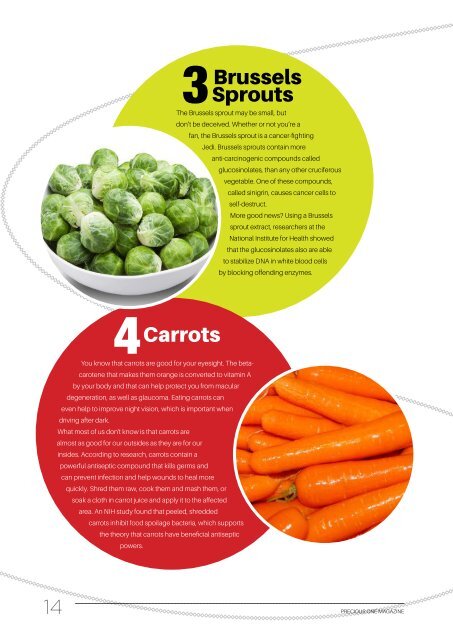PreciouOne eMagazine
You also want an ePaper? Increase the reach of your titles
YUMPU automatically turns print PDFs into web optimized ePapers that Google loves.
3<br />
Brussels<br />
5<br />
Sprouts<br />
The Brussels sprout may be small, but<br />
don’t be deceived. Whether or not you’re a<br />
fan, the Brussels sprout is a cancer-fighting<br />
Jedi. Brussels sprouts contain more<br />
anti-carcinogenic compounds called<br />
glucosinolates, than any other cruciferous<br />
vegetable. One of these compounds,<br />
called sinigrin, causes cancer cells to<br />
self-destruct.<br />
More good news? Using a Brussels<br />
sprout extract, researchers at the<br />
National Institute for Health showed<br />
that the glucosinolates also are able<br />
to stabilize DNA in white blood cells<br />
by blocking offending enzymes.<br />
Onions<br />
If you slice an onion, and it makes you cry, rejoice! Those<br />
compounds that are bringing tears to your eyes are called<br />
thiosulfinates and they could keep you from having a stroke,<br />
according to some studies. Thiosulfinates act as a natural<br />
blood thinner and can keep blood platelets from<br />
clumping. In addition, the quercitin in onions has<br />
been shown to relax and dilate blood vessels,<br />
which also aids in stroke prevention.<br />
Onions are high in vitamin C, provide calcium,<br />
iron, folic acid, and dietary fiber. And,<br />
because they can kill the H pylori bacteria,<br />
they may also help to prevent—but not<br />
treat—stomach ulcers.<br />
Carrots<br />
You know that carrots are good for your eyesight. The betacarotene<br />
that makes them orange is converted to vitamin A<br />
by your body and that can help protect you from macular<br />
degeneration, as well as glaucoma. Eating carrots can<br />
even help to improve night vision, which is important when<br />
driving after dark.<br />
What most of us don't know is that carrots are<br />
almost as good for our outsides as they are for our<br />
insides. According to research, carrots contain a<br />
powerful antiseptic compound that kills germs and<br />
can prevent infection and help wounds to heal more<br />
quickly. Shred them raw, cook them and mash them, or<br />
soak a cloth in carrot juice and apply it to the affected<br />
area. An NIH study found that peeled, shredded<br />
carrots inhibit food spoilage bacteria, which supports<br />
the theory that carrots have beneficial antiseptic<br />
powers.<br />
6<br />
Bell<br />
Peppers<br />
Crunchy, sweet, and delicious, bell peppers<br />
are also one of the most healthful foods you<br />
can eat. One red bell pepper will provide almost<br />
twice your daily allowance for vitamin C. Bell peppers<br />
also are an excellent source of vitamin B6, which is used<br />
by your body to help regulate metabolism and to enable the<br />
cells in your brain to communicate with one another.<br />
Bell peppers also contain minerals, including potassium, zinc,<br />
and manganese. According to The Linus Pauling<br />
Institute, their high levels of manganese may<br />
help to prevent osteoporosis.<br />
14 PRECIOUS ONE MAGAZINE<br />
PRECIOUS ONE MAGAZINE<br />
15
















